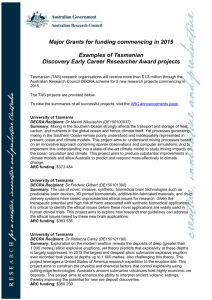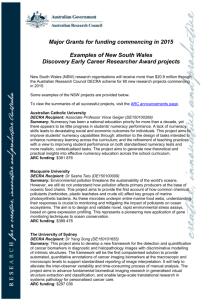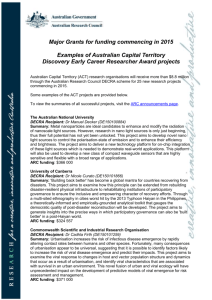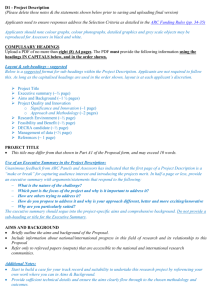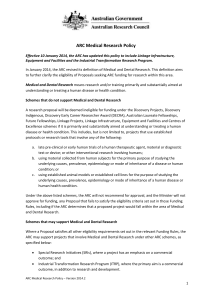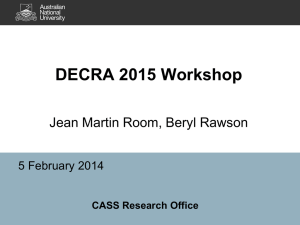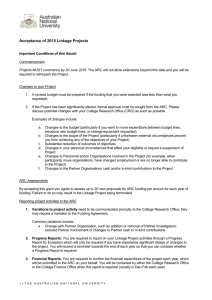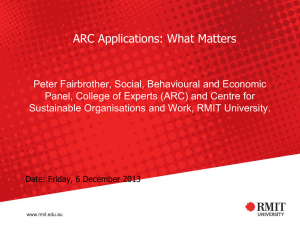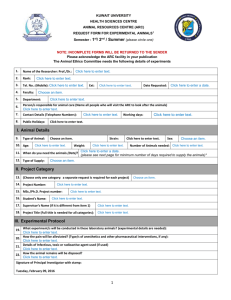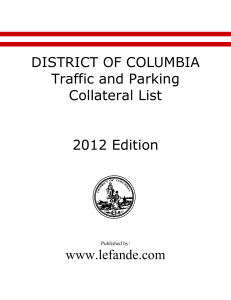FREQUENTLY ASKED QUESTIONS Discovery Early Career
advertisement
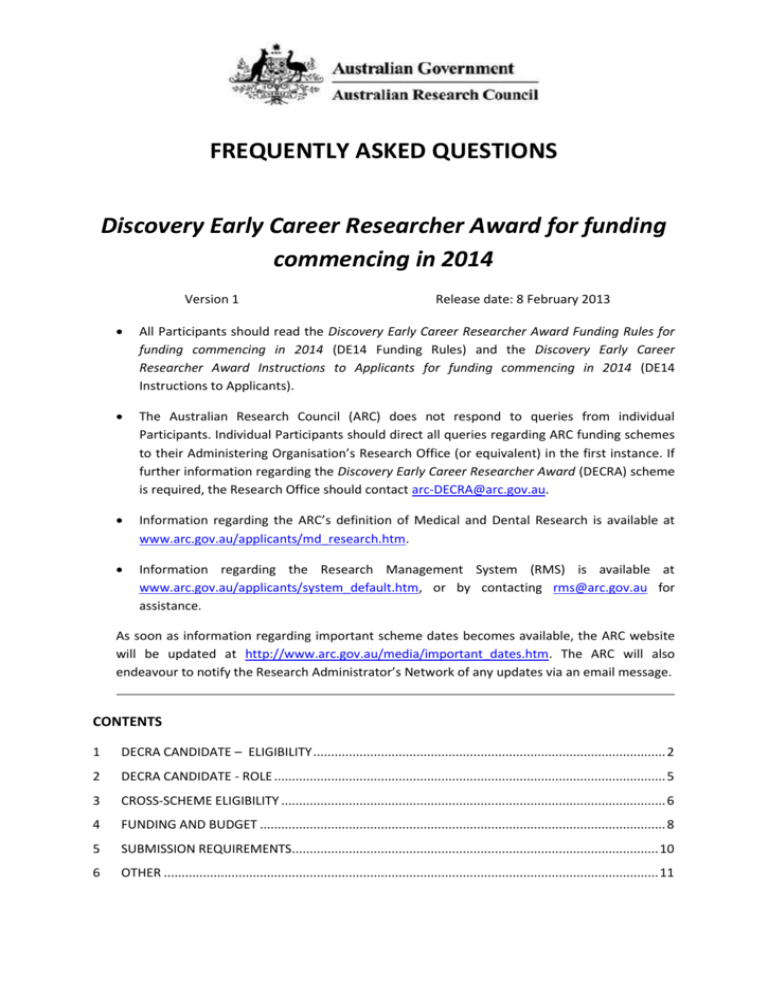
FREQUENTLY ASKED QUESTIONS Discovery Early Career Researcher Award for funding commencing in 2014 Version 1 Release date: 8 February 2013 All Participants should read the Discovery Early Career Researcher Award Funding Rules for funding commencing in 2014 (DE14 Funding Rules) and the Discovery Early Career Researcher Award Instructions to Applicants for funding commencing in 2014 (DE14 Instructions to Applicants). The Australian Research Council (ARC) does not respond to queries from individual Participants. Individual Participants should direct all queries regarding ARC funding schemes to their Administering Organisation’s Research Office (or equivalent) in the first instance. If further information regarding the Discovery Early Career Researcher Award (DECRA) scheme is required, the Research Office should contact arc-DECRA@arc.gov.au. Information regarding the ARC’s definition of Medical and Dental Research is available at www.arc.gov.au/applicants/md_research.htm. Information regarding the Research Management System (RMS) is available at www.arc.gov.au/applicants/system_default.htm, or by contacting rms@arc.gov.au for assistance. As soon as information regarding important scheme dates becomes available, the ARC website will be updated at http://www.arc.gov.au/media/important_dates.htm. The ARC will also endeavour to notify the Research Administrator’s Network of any updates via an email message. CONTENTS 1 DECRA CANDIDATE – ELIGIBILITY ................................................................................................... 2 2 DECRA CANDIDATE - ROLE .............................................................................................................. 5 3 CROSS-SCHEME ELIGIBILITY ............................................................................................................ 6 4 FUNDING AND BUDGET .................................................................................................................. 8 5 SUBMISSION REQUIREMENTS....................................................................................................... 10 6 OTHER ........................................................................................................................................... 11 1 DECRA CANDIDATE – ELIGIBILITY 1.1 Is DECRA open to applicants who hold degrees or have experience which might be considered a PhD equivalent? The DECRA scheme acknowledges the PhD as an important qualification in establishing a research career. In accordance with subsection 6.2.1 of the DE14 Funding Rules a DECRA candidate must hold a PhD to be eligible for this scheme. Research experience as a PhD equivalent will not be considered for funding purposes. The DE14 Funding Rules do not include a pre-submission eligibility exemption process to deal with PhD equivalency matters. These matters are managed during the peer review and selection processes. The ARC will use the requirements of the Doctoral Degree specified by Level 10 of the Australian Qualifications Framework Second Edition 2013 (available at www.aqf.edu.au ) in establishing equivalency of alternatively named awards. Applicants should address these equivalency issues in their application in Part G of the DE14 Proposal form. 1.2 What does the ‘Award of PhD Date’ mean? The ‘Award of PhD Date’ means the date of conferral of a PhD (that is, the date of the graduation ceremony, regardless of whether the applicant attended the ceremony or received the award in absentia). The ‘Award of PhD Date’ is not the date of submission of the thesis, nor the date the thesis was accepted by the examination board. 1.3 Is a researcher eligible to apply for funding commencing in 2014 if their PhD will be awarded between 2 March and 27 March 2013? The DECRA scheme is intended for researchers up to five years post-PhD. For this round of DECRA, researchers who have been awarded a PhD on or after 1 March 2008 until the closing date for Proposals (27 March 2013) are eligible to apply. 1.4 Can you please confirm that a DECRA Candidate awarded a PhD between 1 March 2005 and 1 March 2008 is only eligible if they have had one or more periods of significant career interruption between the 1 March 2005 and 1 March 2013? Yes. In accordance with subsection 6.2.1.b of the DECRA Funding Rules, a DECRA Candidate awarded a PhD between 1 March 2005 and 1 March 2008 must, at the closing time of submission of Proposals, have a commensurate period of significant career interruption (as defined in the DE14 Funding Rules) between 1 March 2005 and 1 March 2013. If taken into account, the period of the career interruption must equate with the Candidate’s PhD being awarded on or after 1 March 2008. Any career interruptions prior to 1 March 2005 will not be taken into account. Please note that, as well as falling within the allowable timeframe, a career interruption must be of one of the types described in section 6.2.1.b of the DE14 Funding Rules. 1.5 If a researcher was awarded their PhD on 1 June 2007 (nine months prior to the 1 March 2008) and had a ten month eligible career interruption from 1 July 2007 to 1 May 2008, would they be eligible to apply for a DECRA? Yes. The researcher in the example above has a ten month career interruption in the eligible period which accounts for their PhD being awarded nine months prior to the 1 March 2008. In accordance with subsection 6.2.1 b of the DE14 Funding Rules, a researcher with a PhD awarded between 1 March 2005 and 1 March 2008 must have a commensurate period of significant career interruption between 1 March 2005 and 1 March 2013. Any significant career interruption prior to 1 March 2005 will not be considered. Please note that, as well as falling within the allowable timeframe, a career interruption must be of one of the types described in section 6.2.1.b of the DE14 Funding Rules. 1.6 If a researcher was awarded their PhD on 1 June 2007 (nine months prior to the 1 March 2008) and had a nine month eligible career interruption from 1 July 2004 to 1 April 2005, would they be eligible to apply for a DECRA? No. The researcher in the example above only has one month of the career interruption in the eligible period of 1 March 2005 to 1 March 2013. This does not account for their PhD being awarded nine months prior to the 1 March 2008. In accordance with subsection 6.2.1 b of the DE14 Funding Rules, a researcher with a PhD awarded between 1 March 2005 and 1 March 2008 must have a commensurate period of significant career interruption between 1 March 2005 and 1 March 2013. Any significant career interruption prior to 1 March 2005 will not be considered. Please note that, as well as falling within the allowable timeframe, a career interruption must be of one of the types described in section 6.2.1.b of the DE14 Funding Rules. 1.7 If a researcher was awarded their PhD on 1 June 2007 (nine months prior to the 1 March 2008) and had a six month eligible career interruption from 1 July 2007 to 1 January 2007, would they be eligible to apply for a DECRA? No. The researcher in the example above only has a six month career interruption in the eligible period which does not account for their PhD being awarded nine months prior to the 1 March 2008. In accordance with subsection 6.2.1 b of the DE14 Funding Rules, a researcher with a PhD awarded between 1 March 2005 and 1 March 2008 must have a commensurate period of significant career interruption between 1 March 2005 and 1 March 2013. Any significant career interruption prior to 1 March 2005 will not be considered. Please note that, as well as falling within the allowable timeframe, a career interruption must be of one of the types described in section 6.2.1.b of the DE14 Funding Rules. 1.8 A DECRA Candidate works for 30 months in a 0.7 FTE research and teaching position and the remaining time (0.3 FTE) at home looking after children. Can a career interruption be claimed? Yes. In the example above the Candidate may be able to claim up to 30% of this period (nine months in total) as a career interruption, provided the time claimed falls within the eligible period specified in subsection 6.2.1.b of the DE14 Funding Rules. The part-time nature of the employment would also be a factor considered under Part CResearch Opportunity and Performance Evidence (ROPE) in the DE14 Proposal form. 1.9 What types of career interruptions are acceptable? Subsection 6.2.1.b of the DE14 Funding Rules lists the acceptable significant career interruptions. These are: carer’s responsibility; disruption due to international relocation for international post-doctoral studies not exceeding more than 3 months; illness; maternity or parental leave; and/or unemployment or non-research employment where the work is predominantly nonresearch (not exceeding three years). 1.10 Can you please clarify whether the term ‘international relocation’ in the DE14 Funding Rules only relates to physical relocation activities associated with a researcher taking up an international post-doctoral position or to the whole period of the fellowship/ studies/ research position? The term ‘relocation for international post-doctoral studies’ as mentioned in subsection 6.2.1.b.ii of the DE14 Funding Rules refers to the initial activities directly relating to relocating overseas, such as time spent organising rental properties and moving personal belongings. If the DECRA Candidate encountered further difficulties after the relocation period was completed, this would not be considered a disruption due to relocation. The ARC may consider more than one career interruption due to international relocation. In these cases up to three months may be allowed per relocation, if justified. Please provide details of each relocation under G.7 of the Proposal form. 1.11 What is the definition of international post-doctoral studies? International post-doctoral studies means post-doctoral studies, including a fellowship, teaching and/or research position and other similar opportunities, undertaken in a country other than the country where the Candidate’s PhD was awarded. 1.12 A DECRA Candidate is employed in a teaching only or non-research position where no research opportunity is provided for in the employment contract. Can a career interruption be claimed? Yes. The time spent in non-research employment, with no opportunity for research, may be considered a career interruption under subsection 6.2.1.b of the DE14 Funding Rules, provided the employment was within the eligible period of 1 March 2005 to 1 March 2013. 1.13 A DECRA Candidate is employed in a full-time academic position where research is a component of the role as specified in the employment contract. Can a career interruption be claimed? No. Employment in a teaching role which allows some time for research is not considered a career interruption. However, the amount of time available for research activities will be considered as a factor in Part C- Research Opportunity and Performance Evidence (ROPE) in the DE14 Proposal form. 1.14 A DECRA Candidate is employed for 12 months in a 0.5 FTE teaching only or nonresearch position and has no additional employment or carer responsibilities. Can a career interruption be claimed? Yes. In the example above the Candidate may be able to claim up to twelve months as a career interruption as non-research roles and unemployment are listed as valid career interruptions under subsection 6.2.1.b of the DE14 Funding Rules. Please note that, as well being one of the types described in section 6.2.1.b of the DE14 Funding Rules, a career interruption must also fall within the allowable timeframe (that is, between 1 March 2005 and 1 March 20013). 1.15 Is DECRA open to international applicants? Yes. International applicants are eligible to apply provided they meet all of the eligibility criteria, including the requirement under subsection 6.2.4 of the DE14 Funding Rules that they must legally reside predominantly in Australia for the duration of the Award. This requirement does not necessarily require Australian residency or citizenship status. 2 DECRA CANDIDATE - ROLE 2.1 Does a DECRA Candidate need to hold an appointment at the Administering Organisation at the closing time for submission of Proposals? No. The Candidate does not need to hold an appointment at the time of Proposal submission but, as noted in subsection 6.2.2 of the DE14 Funding Rules, must hold an appointment at the Administering Organisation for the duration of the Award. Details of the prospective appointment must be included in the Organisational Statement in respect to the Research Environment as required under section 4.4 of the DE14 Funding Rules. 2.2 What kind of appointment does a DECRA Recipient need to hold at the Administering Organisation for the duration of the Award? As outlined in subsection 6.2.6 of the DE14 Funding Rules, the appointment must be appropriate to support the DECRA Recipient for the duration of the Award. For example, if a DECRA is undertaken over three years on a full time basis, the appointment must be three years full time equivalent (FTE). If a DECRA is undertaken over six years on a half-time basis, the appointment must be a six years 0.5 FTE. Honorary or Adjunct appointments, as defined in other ARC schemes, are not sufficient to support the Award. 2.3 Can a DE14 recipient remain on their current employment contract while undertaking their DECRA? Yes, if the DECRA Recipient’s employment contract enables them to be employed in accordance with the Funding Rules and Funding Agreement. The following conditions must be met: 2.4 A DECRA Recipient must hold an appointment at the Administering Organisation for the duration of the Award. This excludes honorary, adjunct or equivalent appointments. (Section 6.2.2 of the DE14 Funding Rules) DECRA Recipients must hold an appointment, appropriate to support the DECRA, at the Administering Organisation for the duration of the Award. (Section 9.2 of the DE14 Funding Agreement) The Administering Organisation must ensure that any Personnel who are employed fulltime on a Project and whose salary is provided from the Funding, shall not, without the prior agreement of the ARC, accept any remuneration whatsoever from any source other than the Administering Organisation in respect of work performed on the Project. (Section 8.7 of the Funding Agreement) Is a DECRA Recipient allowed to teach while holding a DECRA? Yes. As described in subsection 6.2.13 of the DE14 Funding Rules, a DECRA Recipient may spend up to 0.15 FTE of her/his time annually on teaching activities. Supervision of honours or postgraduate students is not included in this limit. The DECRA will not be extended to accommodate any periods of teaching. 3 CROSS-SCHEME ELIGIBILITY 3.1 Section 7.1.7 refers to the final year of a Fellowship. Does this mean the final year set out in the Funding Agreement or does it include carryover funding? In accordance with subsection 7.1.6 of the DE14 Funding Rules, a Project is considered to be funded for the years set out in the Funding Agreement. 3.2 May a researcher who is currently holding an ARC Project which will receive funding in 2014 or is applying for an ARC project for funding commencing in 2014 be nominated for a DECRA? Yes. However, in accordance with subsection 7.1.4, a researcher nominated for a DECRA may only be funded for one Project under the following Schemes and Programs combined: Discovery Projects scheme; Discovery Indigenous Researchers Development scheme; Discovery Indigenous scheme or Centre Personnel receiving funding under the ARC Research Centre Program. As per subsection 7.1.6 of the DE14 Funding Rules, a researcher cannot be involved in more than the maximum number of Projects (including ARC Awards and Fellowships) permitted in 2014. That is, a researcher cannot apply for funding that they would not be allowed to hold due to cross-scheme eligibility rules. The number of Projects (including Awards and Fellowships) is calculated at the closing time of submission of Proposals by adding the number of applications the Candidate has submitted with the number of Projects for which they are already receiving funding in 2014. A Project is considered to be funded for the years set out in the Funding Agreement. Please note that a researcher will not be permitted to relinquish a Chief Investigator, Fellowship, Award or Centre Personnel role or an existing ARC grant held on 1 January 2013, to circumvent these limits. 3.3 Can the DECRA Candidate submit the same Proposal for DECRA and Discovery Projects? Yes. A Proposal for the same project can be submitted to both the DECRA and Discovery Projects schemes. If a Proposal is submitted to more than one ARC funding scheme, Part H of the DE14 proposal form should be completed accordingly. Please note in accordance with subsection 7.2.1 of the DE14 Funding Rules the ARC will not duplicate funding for research, including infrastructure, funded as at 1 January 2014 by the Commonwealth. 3.4 May a DECRA Candidate apply for or hold one Discovery Project as a sole Chief Investigator? Yes. In accordance with subsection 7.1.4 of the DE14 Funding Rules, a DECRA Recipient may be funded concurrently for only one Project under the following Schemes and Program combined: Discovery Projects, Discovery Indigenous Researchers Development or Discovery Indigenous schemes, or Centre Personnel receiving funding under the ARC Research Centres Program. This is in addition to the DECRA and can be as a sole Chief Investigator. 3.5 Can a current ARC Fellowship or ARC Award recipient apply for a DECRA? Yes, but only in the final year of that Fellowship or Award. In accordance with subsection 7.1.7 an ARC Fellowship or ARC Award recipient cannot concurrently hold more than one ARC Fellowship or ARC Award. Therefore, an ARC Fellowship or ARC Award recipient may only apply for a DECRA in the final year of that Fellowship or ARC Award. A Fellowship or Award is considered to be funded for the years set out in the Funding Agreement. 3.6 Are Postdoctoral Research Associates on Australian Laureate Fellowships considered to be ARC Fellows or Award recipients? No. ‘ARC Fellowship’ is defined in the DE14 Funding Rules as a named Fellowship position within any ARC scheme where the salary is funded wholly or partly by the ARC. The DE14 Funding Rules also define an ‘ARC Award’ as a named Award within any ARC scheme, where the salary is wholly or partly funded by the ARC. As Postdoctoral Research Associates (PDRAs) employed on an Australian Laureate Fellowship are not named Fellows on the Proposal, they are not considered to be ARC Fellows or ARC Award recipients. Therefore they would not need to wait until the final year of the PDRA funding to apply for a DECRA. 4 FUNDING AND BUDGET 4.1 What is the maximum per annum salary a DECRA Candidate can be paid by the ARC? Can project costs be used to supplement a DECRA Candidate’s salary? Subsection 5.1.2 of the DE14 Funding Rules states that the per annum salary contribution from the ARC is fixed at $91,740, including 28 per cent on-costs. Additional salary contributions will not be provided by the ARC, however, the Administering Organisation may ‘top up’ a successful DECRA Candidate’s salary. Project costs cannot be used for a DECRA Candidate’s salary. 4.2 At what funding level can a DECRA be applied for? Subsection 5.1.2 of the DE14 Funding Rules states the DECRA may be awarded ARC funding of up to $131,740. In addition to the fixed annual salary contribution of $91,740 (including oncosts) project costs of up to $40,000 can be requested for each funding year. 4.3 Can you please clarify 5.3.1.a ‘bench fees or similar laboratory access fees’ under ‘Budget Items Not Supported’ in the DE14 Funding Rules? Bench fees are an institutionally applied fee or levy for the provision of general laboratory access. Access to specialised equipment (such as electron microscopes) does not fall into this category and therefore, if this type of access is required for the project, a usage fee may be requested from the ARC under the DE14 Funding Rules. All budget requests must be fully justified. 4.4 My research requires me to conduct field research in remote areas of Australia and overseas. Will the field research costs come out of the $50,000 limit on travel over the life of the project as per 5.2.1.i of the DE14 Funding Rules? No. The $50,000 travel limit referred to in subsection 5.1.2.i of the DE14 Funding Rules does not apply to costs associated with fieldwork research. Field research costs should be requested in the DE14 proposal form under the category ‘Other’. Subsection 5.2.1.d of the DE14 Funding Rules notes that items associated with fieldwork may include technical and logistical support as well as travel and accommodation costs. For the purposes of clarification, accommodation and living costs for the DECRA Recipient in the field would be considered field research costs. Note that all funding requests must be fully justified. 4.5 Can you please clarify whether the Project Cost table must be included under Part F (Budget Justification) of the DE14 proposal form? The Project Cost table may be included, however this is not mandatory. Part F of the DE14 proposal form must not exceed two A4 pages, therefore all budget justifications must be concise in nature. The justification should indicate how the DECRA candidate will use the project funding each year. This statement should include the need and cost for each item requested from the ARC using the same headings as in the budget at Part E1 of the Proposal form. Although the budget justification should be broken down into separate headings for each year, the DECRA Candidate may refer back to the description in the first year of funding to avoid duplication. 4.6 Should any cash and/or in-kind contributions by the Administering Organisation be included in the Part E (Project Cost) of the DE14 Proposal form? No. The DECRA budget, Part E (Project Cost) of the DE14 Proposal form, should only include ARC contributions. The functionality to include Administering Organisation contributions is available in RMS but is not relevant for this scheme. Contributions from the Administering Organisation can be detailed in Part D2 (Organisational Statement in respect of the Research Environment) of the DE14 Proposal form. The Administering Organisation’s contribution should not be included in Part E or Part F of the Proposal form. As there is a two page limitation to Part F (Budget Justification), this space should be fully utilised for the ARC budget justification. 4.7 Can the DECRA salary be used for teaching relief? In accordance with subsection 6.2.8 of the DE14 Funding Rules, the DECRA salary component may be used for other purposes, including teaching relief, to support the Project in exceptional or changed personal circumstances with the approval of the Administering Organisation without extension to the life of the Project. Teaching relief is not for the DECRA Recipient and should only be used if a replacement is required for short time periods to support the Project during exceptional or changed personal circumstances. 4.8 Where in the budget table do I request travel costs that are related to fieldwork research? As per subsection 5.2.1(i) of the Funding Rules, travel costs related to carrying out fieldwork research are not included in the $50,000 limit for travel over the life of the Project. Travel costs associated with fieldwork should be requested under the section ‘Other’ within the budget table and justified in terms of need and cost in Part F of the Proposal form in RMS. The main purpose of any travel designated as fieldwork must be to carry out the research, not to attend a conference or other related meetings. 5 SUBMISSION REQUIREMENTS 5.1 Can other researchers or organisations be nominated on the Proposal in addition to the DECRA Candidate and Administering Organisation? No. The DECRA Proposal form will only allow one DECRA Candidate and one Administering Organisation to be listed. No other participant or organisational roles will be available. 5.2 Can an application make reference to additional team members or people who will support them with the project within the application itself? Yes. Any support from additional team members will be assessed under the selection criterion 'Research Environment’. Support from additional team members at the Administering Organisation should be detailed at Part D2 (Organisational Statement in respect of the Research Environment) of the DE14 Proposal form. For further information please see subsection 4.4 b of the DE14 Funding Rules and Part D2 of the Instructions to Applicants. In addition, the DECRA Candidate can name other collaborators and their contribution to the Project in Part D1 (Project Description) of the DE14 Proposal Form. 5.3 Does the DECRA candidate need to submit an Eligibility Exemption Request to claim career interruption? There is no Eligibility Exemption Request process for DECRA. The justification for career interruption must be submitted as part of the Proposal (Part G7.2 of the DE14 Proposal form). The closing time for submission of Proposals is 5:00pm (AEDT) 27 March 2013. 5.4 If the DECRA Candidate’s residency status is pending can this be included in the DECRA Proposal? Yes. The DECRA Candidate must meet the eligibility requirements in section 6 and 7 of the DE14 Funding Rules. The pending status must be highlighted under the Citizenship/Residency Details in Part G (Personnel) of the Proposal form. Please note, as stated in subsection 6.2.4 of the DE14 Funding Rules, the DECRA Recipient must legally reside predominantly in Australia for the duration of the Award. 5.5 Does the DECRA scheme have a certification proforma? Yes. The certification proforma is available on the ARC website at the following web address: www.arc.gov.au/ncgp/decra/de_certification.htm. The use of this form is not mandatory, however the Administering Organisation must meet the requirements for having evidence of certification as stated in subsection 8.4 of the DE14 Funding Rules. 5.6 If publication and disseminations costs should not be included in the budget, how will the 2% for publication and dissemination costs from the total project costs be allocated? In accordance with subsection 12.6.1 of the DE14 Funding Rules, successful DECRA candidates may choose to spend up to 2% of the total awarded project costs on publication and dissemination costs during the life of the Project with no prior approval. Publication and dissemination costs should not be included as itemised budget items. Please note however that DECRA Candidates should include information in Part D (Project Description) of the DE14 Proposal form regarding their strategies for dissemination, as required under subsections 4.3.c and 12.6.2 of the DE14 Funding Rules. 5.7 If a DECRA applicant will be working in a country which isn’t listed in the drop-down country menu. How do I record it on the application form? If the proposed research involves international collaboration with a country not specified on the drop-down menu in Part B5 of the DE14 Proposal form, please choose ‘Unspecified’. Details of the international collaboration should be listed in Part D (Project Description) of the DECRA Proposal form. 6 OTHER 6.1 If I am successful in receiving funding for a DE14 and I need to transfer to another institution, how do I institute this transfer? The ARC will only consider the transfer of a Project to another Eligible Organisation where the circumstances are exceptional. Please refer to section 16 of the DE14 Funding Agreement at www.arc.gov.au/ncgp/decra/fundingagreement.htm. A transferral of funding between institutions can only be processed once the outcome of the funding has been announced and the Funding Agreement executed. If an applicant is successful, a Funding Agreement will be sent to the institution which applied for the funding at the time of submission (the Administering Organisation). If the applicant requests a transfer to another institution, then the Administering Organisation must agree to the transfer of funding and submit a Variation of Funding Agreement form which is available at www.arc.gov.au/applicants/variation.htm.
